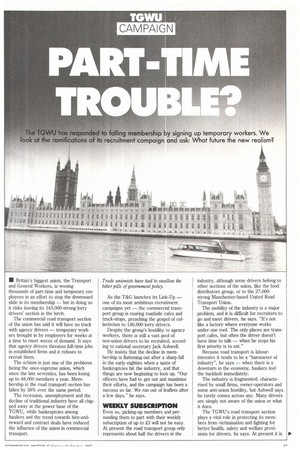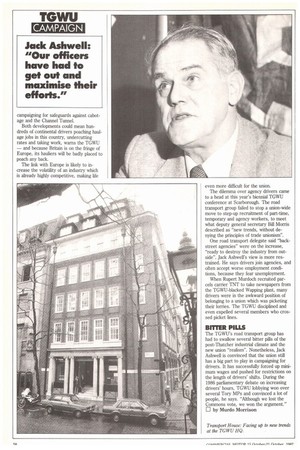PART
Page 59

Page 60

If you've noticed an error in this article please click here to report it so we can fix it.
• The TGWU has responded to falling membership by signing up temporary workers. We look at the ramifications of its recruitment campaign and ask: What future the new realism?
• Britain's biggest union, the Transport and General Workers, is wooing thousands of part-time and temporary employees in an effort to stop the downward slide in its membership — but in doing so it risks leaving its 143,000-strong lorry drivers' section in the lurch.
The commercial road transport section of the union has said it will have no truck with agency drivers — temporary workers brought in by employers for weeks at a time to meet waves of demand. It says that agency drivers threaten full-time jobs in established firms and it refuses to recruit them.
The schism is just one of the problems facing the once-supreme union, which since the late seventies, has been losing up to 48,000 members a year. Membership in the road transport section has fallen by 38% over the same period.
The recession, unemployment and the decline of traditional industry have all chipped away at the power base of the TGWU, while bankruptcies among hauliers and the trend towards hire-andreward and contract deals have reduced the influence of the union in commercial transport.
Trade unionists have had to swallow the bitter pills of government policy.
As the T&G launches its Link-Up — one of its most ambitious recruitment campaigns yet — the commercial transport group is touring roadside cafes and truck-stops, preaching the gospel of collectivism to 150,000 lorry drivers.
Despite the group's hostility to agency workers, there is still a vast pool of non-union drivers to be recruited, according to national secretary Jack Ashwell.
He insists that the decline in membership is flattening-out after a sharp fall in the early eighties when a spate of bankruptcies hit the industry, and that things are now beginning to look up. "Our officers have had to get out and maximise their efforts, and the campaign has been a success so far. We ran out of leaflets after a few days," he says.
WEEKLY SUBSCRIPTION
Even so, picking-up members and persuading them to part with their weekly subscription of up to £3 will not be easy. At present the road transport group only represents about half the drivers in the industry, although some drivers belong to other sections of the union, like the food distributors group, or to the 27,000strong Manchester-based United Road Transport Union.
The mobility of the industry is a major problem, and it is difficult for recruiters to go and meet drivers, he says. "It's not like a factory where everyone works under one roof. The only places are transport cafes, but often the driver doesn't have time to talk — when he stops his first priority is to eat."
Because road transport is labourintensive it tends to be a "barometer of industry", he says — when there is a downturn in the economy, hauliers feel the backlash immediately.
The industry is fragmented; characterised by small firms, owner-operators and some anti-union hostility, but Ashwell says he rarely comes across any. Many drivers are simply not aware of the union or what it does.
The TGWU's road transport section plays a vital role in protecting its members from victimisation and fighting for better health, safety and welfare provisions for drivers, he says. At present it is campaigning for safeguards against cabotage and the Channel Tunnel.
Both developments could mean hundreds of continental drivers poaching haulage jobs in this country, undercutting rates and taking work, warns the TGWU — and because Britain is on the fringe of Europe, its hauliers will be badly placed to poach any back.
The link with Europe is likely to increase the volatility of an industry which is already highly competitive, making life even more difficult for the union.
The dilemma over agency drivers came to a head at this year's biennial TGWU conference at Scarborough. The road transport group failed to stop a union-wide move to step-up recruitment of part-time, temporary and agency workers, to meet what deputy general secretary Bill Morris described as "new trends, without denying the principles of trade unionism".
One road transport delegate said "backstreet agencies" were on the increase, "ready to destroy the industry from outside". Jack Ashwell's view is more restrained. He says drivers join agencies, and often accept worse employment conditions, because they fear unemployment.
When Rupert Murdoch recruited parcels carrier TNT to take newspapers from the TGWU-blacked Wapping plant, many drivers were in the awkward position of belonging to a union which was picketing their lorries. The TGWU disciplined and even expelled several members who crossed picket lines.
BITTER PILLS
The TGWU's road transport group has had to swallow several bitter pills of the post-Thatcher industrial climate and the new union "realism". Nonetheless, Jack Ashwell is convinced that the union still has a big part to play in campaigning for drivers. It has successfully forced up minimum wages and pushed for restrictions on the length of drivers' shifts. During the 1986 parliamentary debate on increasing drivers' hours, TGWU lobbying won over several Tory MPs and convinced a lot of people, he says. "Although we lost the Commons vote, we won the argument." 0 by Murdo Morrison




































































































